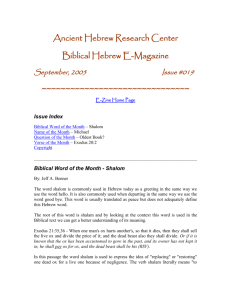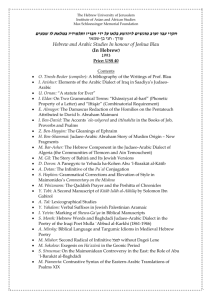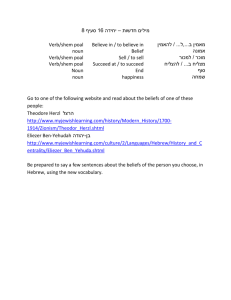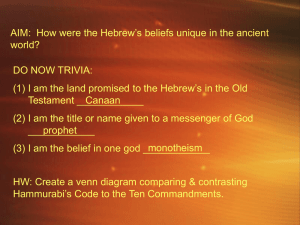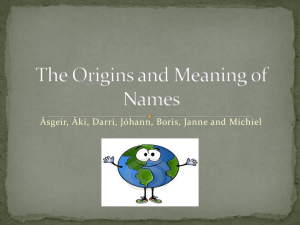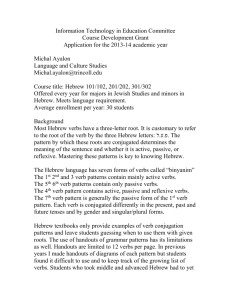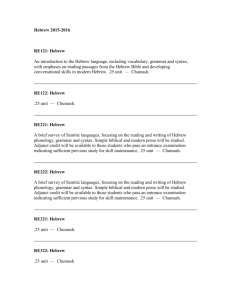Biblical Hebrew E-Magazine - Ancient Hebrew Research Center
advertisement
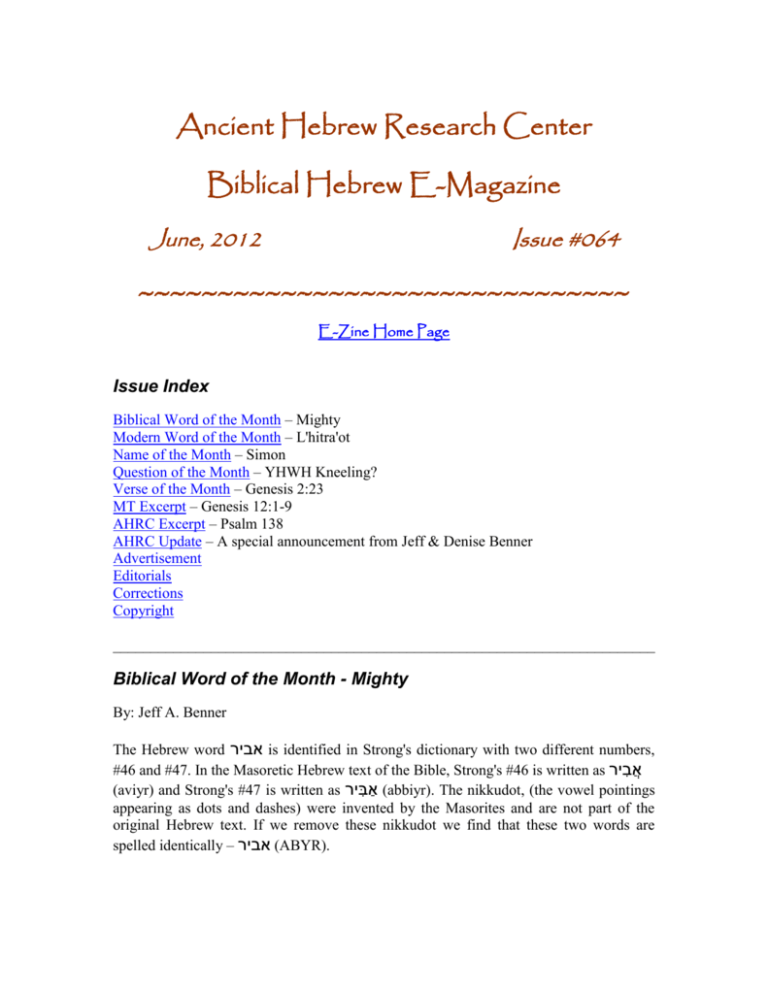
Ancient Hebrew Research Center Biblical Hebrew E-Magazine June, 2012 Issue #064 ~~~~~~~~~~~~~~~~~~~~~~~~~~~~~~~ E-Zine Home Page Issue Index Biblical Word of the Month – Mighty Modern Word of the Month – L'hitra'ot Name of the Month – Simon Question of the Month – YHWH Kneeling? Verse of the Month – Genesis 2:23 MT Excerpt – Genesis 12:1-9 AHRC Excerpt – Psalm 138 AHRC Update – A special announcement from Jeff & Denise Benner Advertisement Editorials Corrections Copyright ________________________________________________________________________ Biblical Word of the Month - Mighty By: Jeff A. Benner The Hebrew word אבירis identified in Strong's dictionary with two different numbers, #46 and #47. In the Masoretic Hebrew text of the Bible, Strong's #46 is written as אֲ ִביר (aviyr) and Strong's #47 is written as ( אַ ִבירabbiyr). The nikkudot, (the vowel pointings appearing as dots and dashes) were invented by the Masorites and are not part of the original Hebrew text. If we remove these nikkudot we find that these two words are spelled identically – ( אבירABYR). Biblical Hebrew E-Magazine These nikkudot were added to aid in the pronunciation of Hebrew words, but I am also of the opinion that some nikkudot were added to separate out words to give the impression that they are two different words for reasons which will be apparent below. The Hebrew word ( אבירaviyr/abbiyr, Strong's #46/47) is translated in the KJV as bull, strong, mighty, stouthearted, valiant, angel and chiefest, but we must remember that the Hebrew language, being a concrete language, concentrates on the function or action of something rather than its appearance. This noun is not attempting to describe a specific entity, but an action that is common among different entities. If you have ever watched an eagle soar and thought how majestic it is, you understand the meaning of the Hebrew word ( אבירaviyr/abbiyr). The root of this word is the verb אבר (A.B.R, Strong's #82) meaning "soar" and is used in only once in the Hebrew Bible. Is it by your wisdom that the hawk soars, and spreads his wings toward the south? (RSV, Job 39:26) My translation of the noun ( אבירaviyr/abbiyr) is "valiant" and defined as, "Possessing or acting with bravery or boldness. The mighty power of a bird in flight. Anything or anyone of great mental or physical strength." Strong's number #46 ( אֲ ִבירaviyr) is always used in the context of YHWH being the "valiant one of Israel/Jacob." …I am YHWH your rescuer and your redeemer, the valiant one of Jacob. (Isaiah 49:26) Strong's #47 ( אַ ִבירabbiyr) is used for any other "valiant" one. Then the heels (hoofs) of horses will strike from the galloping, the galloping of his valiant ones. (Job 5:22) ________________________________________________________________________ Modern Word of the Month - L'hitra'ot By: Jeff A. Benner A common departing greeting in Israel today is the word ( להתראותl'hitra'ot). This word is derived from the verb ( ראהR.A.H, Strong's #7200) meaning to "see." The prefix ( התhit) makes the verb "reflexive," which directs the action of the verb being performed by the one speaking. The suffix ( ותot) makes the verb "infinitive" meaning that the action is not being directed toward anyone or anything specific (Note that when this suffix is added to the verb, the letter ( הh) drops from the end of the verb). The prefix ל (l) means "to." When all of this is put together we have the literal meaning of "to be 2 Biblical Hebrew E-Magazine seeing" for the Hebrew word להתראותand is equivalent to our expression, "I'll be seeing you" and "see you later." ________________________________________________________________________ Name of the Month - Simon By: Jeff A. Benner The name Simon is the Greek transliteration of the Hebrew name ( שמעוןshimon, Strong's #8095). This name is also the name of one of the sons of Jacob. And she again conceived and she bore a son and she said, "because YHWH heard that I was hated, he gave to me also this one," and she called his name Shimon. (Genesis 29:33) The name ( שמעוןshimon) is derived from the verb ( שמעSh.M.A, Strong's #8085) meaning to "hear" and the name ( שמעוןshimon) means "hearer." Notice that both of these words (the name and the verb) appear in the passage above. Leah named her son "hearer" because YHWH "heard" her. We find this same name and verb relationship in the book of John in the New Testament for the Apostle Shimon. That disciple whom Jesus loved said to Peter, "It is the Lord!" When Simon Peter heard that it was the Lord, he put on his clothes, for he was stripped for work, and sprang into the sea. (RSV, John 21:7) _______________________________________________________________________ Question of the Month – YHWH Kneeling? By: Jeff A. Benner Q: Why does your translation of Numbers 6:24 have YHWH kneeling? A: Most Bible versions translate Numbers 6:24 as, "The LORD bless you and keep you," but in my translation it reads, "YHWH will kneel before you in respect and guard you with a hedge of protection." Most translations use the abstract words "bless" and "keep" to translate the Hebrew verbs ( ברךB.R.K, Strong's #1288) and ( שמרSh.M.R, Strong's #8104), but as I have often stated, Hebrew is a very concrete language and just one or two abstract English words can never adequately convey the meaning of the Hebrew. For this reason I have translated ברךas "kneel down in respect" and שמרas "guard with a hedge of protection," the more literal meanings of these words. 3 Biblical Hebrew E-Magazine Getting back to the original question, why do I use "kneel in respect" instead of "bless" like all the other translations. The first reason is that the word "bless" is, as I mentioned above, an abstract term that has no foundation in any concrete concept. For this reason alone we must throw out the word "bless" and look for a more concrete English translation. Second, the verb used in Numbers 6:24 is the intensive (piel) form of the verb ( ברךB.R.K) and we must define the intensive form of any verb in relation to the simple meaning of that verb. Let me explain. Each Hebrew verb may be written in specific ways to express varying nuances of a verb. These different verb "forms" are always related to the meaning of the original verb. Below are a few examples to demonstrate this. Simple Passive Causative Intensive Take Be taken Cause to take Steal Hear Be heard Cause to hear Summon Speak Talk Command Promise Know Be known Make known Understand Turn Be turned Make turn Turn away Cut Be cut Cause to cut Hack Sit Be set down Cause to sit Set in place Eat Be eaten Cause to eat Devour Die Be dead Kill Destroy Send Be sent Send away Dismiss We can easily recognize that the English words "kneel" and "bless" have no relationship to each other, therefore "bless" is not a valid translation for the Hebrew verb ברך (B.R.K). Instead, we need to define the intensive form of the verb ( ברךB.R.K) as it relates to the idea of "kneeling." The simple meaning of the verb ( ברךB.R.K) is to "kneel down" as can be seen in the following passage. And he made his camels to kneel down… (Genesis 24:11) The Passive form of this verb would be to "be knelt down." The Causative form would be to "cause to kneel down." The Intensive form would then have a meaning related to the idea of kneeling down. The intensive form of this verb is always used in the context showing respect to someone else as can be seen in the following passages. 4 Biblical Hebrew E-Magazine And I will make you great nation, and I will ______ you and I will make your name great and it will be a gift. (Genesis 12:2) Before we fill in the blank, let's look at the word "gift." The Hebrew word is the noun ( ברכהberakah, Strong's #1293), which is derived from the verb ( ברךB.R.K). While the KJV often translates this noun as "blessing," the KJV also translates it as "present" as found in the following passage. And when David came to Ziklag, he sent of the spoil unto the elders of Judah, even to his friends, saying, Behold a present for you of the spoil of the enemies of the LORD; (KJV, 1 Samuel 30:26) A berakah is a present or gift. This noun is related to the verb ( ברךB.R.K), meaning to "kneel," in the sense of presenting a gift to another on bended knee. This is a sign of "respect" and it is this word that I believe the intensive form of ( ברךB.R.K) means, but with the fuller concrete meaning of "to kneel down before another in respect" (note that this does not have to mean a literal kneeling down as the Hebrew often uses concrete terms in a figurative sense). And I will make you great nation, and I will respect you and I will make your name great and it will be a gift. (Genesis 12:2) Many people will say, "YHWH will never bow before a man, literally or figuratively." If we think of YHWH as a Supreme Ruler sitting high upon a throne, then I would agree, YHWH could never kneel before another. However, this is not the YHWH I read about in the Bible. The YHWH that I read about walks among his people like a father does with his children, and when a child looks up at his father with a question or comment, wouldn't father kneel down before his child and get eye to eye with him and talk with him? This is a father that shows respect to his children. Kneeling before another is not a sign of submission, but instead a sign of respect, which we could say is a blessing to his children. The following is my translation of the entire Aaronic blessing (Numbers 6:24-26) for those that are interested. Yahweh will kneel before you presenting gifts and will guard you with a hedge of protection, Yahweh will illuminate the wholeness of his being toward you bringing order and he will beautify you, Yahweh will lift up his wholeness of being and look upon you and he will set in place all you need to be whole and complete. Also see my video "The Aaronic Blessing" at YouTube. Part 1 Part 2 Part 3 Part 4 5 Biblical Hebrew E-Magazine Part 5 ________________________________________________________________________ Verse of the Month – Genesis 2:23 By: Jeff A. Benner וַי ֹּאמֶ ר הָ ָאדָ ם ז ֹּאת הַ ַפעַ ם עֶ צֶ ם מֵ עֲצָ מַ י ּובָ שָ ר ִמבְּ שָ ִרי לְּז ֹּאת י ִָק ֵרא ִא ָשה כִ י ֵמ ִאיׁש ל ֳֻקחָ ה־ז ֹּאת׃ And the man said, This is now bone of my bones, and flesh of my flesh: she shall be called Woman, because she was taken out of Man. (ASV) ( ַוי ֹּאמֶ רvai-yo-mer) This is one of the most common Hebrew words in the Hebrew Bible. The base word is ( אמרamar) meaning to speak or say. The prefixes to this verb are identical to the word above. This word means "and he said". ( הָ ָאדָ םha-a-dam) The base word is ( אדםadam) meaning “human.” The prefix הmeans “the” – the human. ( ז ֹּאתzot) This word means "this." ( הַ פַעַ םha-pa-am) The base word is ( פעםpa'am), meaning "time" in the sense of the regular and rythmic beating of time. The prefix הmeans “the” – the time. ( עֶ צֶ םe-tsem) This word means "bone." ( מֵ עֲצָ מַ יmey-a-tsa-mai) The base word is ( עצםetsem), a noun meaning "bone." The prefix ( מm) means "from" from bone. The suffix ( יai) is the first person possessive - from my bone, but also identifies the noun as plural - from my bones. ( ּובָ שָ רu-va-sar) The base word is ( בשרbasar), a noun meaning "flesh." The prefix ( וu) means "and" – and flesh. ( ִמבְּ שָ ִריmi-be-sa-riy) The base word is ( בשרbasar), a noun meaning "flesh." The prefix ( מm) means "from" from flesh. The suffix ( יiy) is the first person possessive - from my flesh. 6 Biblical Hebrew E-Magazine ( לְּז ֹּאתle-zot) The base word is ( זותzot), meaning "this." The prefix ( לl) means “to” or "for" – for this (in context this could be translated as "because of this). ( י ִָק ֵראyi-qa-rey) This verb root is ( קראQ.R.A) meaning "call." The prefix ( יy) identifies the subject of the verb as third person, masculine singular and the tense of the verb as passive imperfect he will be called. ( ִאשָ הi-shah) This word means "woman" and is the feminine form of the masculine noun ( אישiysh) meaning "man." ( כִ יkiy) This word means "for" or "because" and is used to explain what came previously. מֵ ִאיׁש (may-iysh) The base word is ( אישiysh), meaning "man." The prefix ( מm) means “from" – from man. ( ל ֳֻקחָ הlu-qa-hhah) This base word is the verb ( לקחL.Q.Hh) meaning a "take." The addition of the "u" vowel makes the verb perfect passive tense – was taken. The suffix ( הah) identifies the subject of the verb as feminine – she was taken. ( ז ֹּאתzot) This word means "this." The following is a literal rendering of this verse from its Hebraic meaning. And the man said, "This is the time*, bone from my bones and flesh from my flesh, because of this he** will be called 'woman,' because from man this*** was taken. * - In context, this means that this event, in contrast to the previous events, is correct. ** - Or "it." Hebrew has no word for "it." *** - The "this" is in reference to the woman, the "she" in the verb יקרא. In following issues we will continue with this chapter. 7 Biblical Hebrew E-Magazine ________________________________________________________________________ Mechanical Translation Excerpt - Genesis 12:1-9 12:1&and “YHWH [He exists]” said to “Avram [Father raised]”, walk yourself from your land and from your kindred and from the house of your father to the land which I will show you, 12:2&and I will make you a magnificent nation and I will respect you and I will magnify your title and exist as a present, 12:3&and I will respect ones respecting you and ones making you insubstantial I will spit upon and all of the families of the ground will be respected with you, 12:4&and “Avram [Father raised]” walked just as “YHWH [He exists]” spoke to him and “Loth [Covering]” walked with him and “Avram [Father raised]” was a son of seventy-five years in his going out from “Hharan [Burning]”, 12:5&and “Avram [Father raised]” took “Sarai [Princess]” his woman and “Loth [Covering]” the son of his brother and all of their goods which they accumulated and the beings which they did in “Hharan [Burning]” and they went out to walk unto the land of “Kena'an [Lowered]” and they came unto the land of “Kena'an [Lowered]”, 12:6&and “Avram [Father raised]” crossed over in the land, as far as the place of “Shekhem [Shoulder]”, as far as the great tree of “Moreh [Teacher]” and the one of “Kena'an [Lowered]” was at that time in the land, 12:7&and “YHWH [He exists]” appeared to “Avram [Father raised]” and said, to your seed I will give this land, and he built there an altar to “YHWH [He exists]” the one appearing to him, 12:8&and he advanced from there unto the hill, from the east to “Beyt-El [House of El]” and he stretched her tent, “Beyt-El [House of El]” was from the sea and “Ay [Heap of ruins]” was from the east and he built there an altar to “YHWH [He exists]” and he called out in the title of “YHWH [He exists]”, 12:9&and “Avram [Father raised]” journeyed, walking and journeying unto the south country, For details on this new translation see the web site at http://www.mechanical-translation.org _______________________________________________________________________ 8 Biblical Hebrew E-Magazine AHRC Website Excerpt – Psalm 138 Differences between the Dead Sea Scrolls and the Masoretic Hebrew Text The text is written in the Late Hebrew Script, but the name of God, יהוהYahweh, is always written in the Middle Hebrew script (see the bottom of the "alphabet" image at the top of the page). In many instances the letter "vav" as found the Dead Sea Scrolls is removed by the Masorites and replaced with the "cholam" nikkud (vowel pointing). For instance, the Dead Sea Scroll has אלוהיםelowhiym the Masoretic text has אלהיםelohiym. In some instances the letter "yud" as found in the Dead Sea Scrolls is removed by the Masorites and replaced with the "chireq" nikkud (vowel pointing). For instance, the Dead Sea Scroll has דוידdaviyd the Masoretic text has דודdavid. The suffix ךwith the "qamats" nikkud following it (pronounced 'ka') represents the possessive pronoun "your" in the Masoretic text. In the Dead Sea Scrolls this possessive pronoun is written as כהkah. The suffix תwith the "qamats" nikkud following it (pronounced 'ta') represents the pronoun "you" in the Masoretic text. In the Dead Sea Scrolls this pronoun is written as תה tah. 9 Biblical Hebrew E-Magazine Besides the grammatical differences there are only three differences in the Psalm. The name Yahweh appears twice in verse one in the Dead Sea Scrolls but is absent in the Masoretic text. In verse seven the Masoretic text has the word קרבqerev meaning "among" while the Dead Sea Scrolls has the word תוךtavek meaning "middle" or "midst." The excerpt above is from an article located on the web site at http://www.ancient-hebrew.org/31_psalm138.html ________________________________________________________________________ AHRC Update A special announcement from Jeff & Denise Benner Shalom Friends: As most of you know, I work as a contract Engineer for a company out of Chicago and travel to various nuclear facilities for special projects. As I only work an average of about five months out of the year, I am home the remainder of the time with my family. Usually, those five months are spread out through the year, but of late I have been working back to back jobs and have been away from home, almost continuously, since September 2011. After this long period of absence, I am finally home for an extended period of time, but because of my absence many of my responsibilities at home have been on hold, including the construction of our log house that my family and I are building. I have decided that I need to devote much of my time and energy for a few months to my family and am therefore taking Sabbatical from the Ancient Hebrew Research Center. Once our log home is completed and the many other projects at home that have been piling up in my absence are finished I will be available to continue my work with the Ancient Hebrew Research Center including answering e-mails, publishing new issues of the Biblical Hebrew e-zine, adding entries on Facebook, making new videos on YouTube, and adding new articles on the website. Thank you all for your continued support, encouragement and devotion to the Ancient Hebrew Research Center and my family. Jeff & Denise Benner and Family ________________________________________________________________________ 10 Biblical Hebrew E-Magazine Advertisements Learn to Read Biblical Hebrew - Volume 2 by Jeff A. Benner (NEW) After learning the Hebrew alphabet, it's time to learn Hebrew grammar, morphology and syntax. This book provides the basics to Hebrew grammar, word construction and syntax, or sentence structure. In addition, it examines each Hebrew word in the Ten Commandments and breaks down the roots, prefixes and suffixes of each word. This book will be a valuable tool for anyone interested in learning how to read the Hebrew Bible in its original language. Additional information and ordering details are available through the bookstore. (http://www.ancient-hebrew.org/bookstore) ________________________________________________________________________ Editorials Do you have a comment or personal insight into the articles in this issue of the E-Zine? If so, let us know. _____________________________________________________________________ Corrections Did you find any errors needing correction in the articles in this issue of the E-Zine? If so, let us know. _____________________________________________________________________ Copyright © 2012 Jeff A. Benner Ancient Hebrew Research Center Please feel free to use, copy or distribute any material within the "Biblical Hebrew E-Magazine" for nonprofit educational purposes only. ________________________________________________________________________ 11


